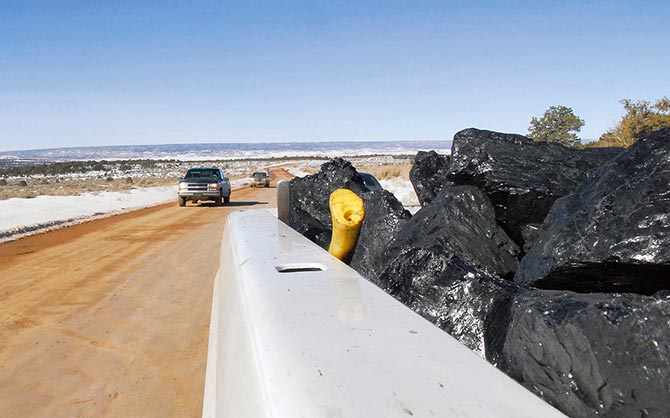Coal harder to come by this winter

(Special to the Times - Donovan Quintero)
The handle of a pick ax sticks out from a truckload of coal as two other pickup trucks haul coal Jan. 8 in Forest Lake, Ariz.
By Cindy Yurth
Tséyi' Bureau
KAYENTA, Jan. 14, 2010
Hopis and Navajos who rely on free or cheap coal from Black Mesa to heat their homes are saying the coal is harder to get this year.
Last Thursday area residents coming down from the public coal yard on Black Mesa reported waits of up to four hours, with one Hopi village representative turned away when a gatekeeper couldn't find his paperwork.
Coal users also complain that Peabody Western Coal Co., which maintains the public sales as part of its agreement with the tribes, has clamped down on overloading - stacking coal above the sides of the truck bed - and that the coal seems to be worse quality than in previous years.
"It is crap," said a Chinle resident who asked to remain anonymous. "It's full of rocks. Then they made me unload about two-thirds of my load because it was above the bed line."
In addition, the coal yard has been moved several miles from its former site next to the Black Mesa Mine, requiring customers approaching from the north to drive further, some complained.
Norman Hunter, a Sichomovi Village employee who was stocking up on free coal for the village elders, said he waited in line for three hours last week, and when he got to the loading site, a Peabody employee couldn't find the paperwork verifying that he qualified for free coal, and turned him away.
"We've been doing this for years," Hunter said. "I don't understand how they could suddenly not have us on file."
Hunter was later allowed to load coal.
A Hotevilla resident said she was told her village was only allotted 50 coupons for a free truckload of coal this year, about half the usual allotment.
Peabody spokeswoman Beth Sutton said the company has for years provided a limited amount of free coal for its employees as well as Hopis and Navajos who live in the area of the mine as a public service. The company also sells coal for $60 a ton to anyone who wants to drive in and load it himself.
Sutton denied the company is tightening up on the handouts - in fact, she said, the opposite is true.
"Last year, the facility handled 200,000 tons of coal, and this year we expect the demand to be much higher," she wrote in an e-mail to the Navajo Times.
According to Sutton, the increased pressure is a result of the closure of the McKinley Mine near Gallup, which also used to sell coal to locals.
"With the closure of McKinley Mine, we have seen an enormous increase in the volume of residents outside the Black Mesa area who are coming to purchase coal because we are the only company in the region that provides this service," Sutton wrote.
Some of the buyers are entrepreneurs who bag up the coal and sell it at a profit at area flea markets.
Even when the McKinley Mine was open, many people traveled to Black Mesa for coal because Peabody provided a better-quality product. Public sales at the McKinley Mine were handled by an outside contractor and the mine operator often dumped its low-grade coal there.
While the waits on Black Mesa are longer because of the increased demand, Sutton said the company has actually made the process of getting coal more efficient this year.
"We've made a number of upgrades to the new coal loading facility, which include improved lighting, new scales and a location that is closer to the mining operations for efficiency," she wrote. "We will evaluate ongoing opportunities to improve efficiencies, but we must strike a balance between running our business operations and providing this community service."
This seems to be little consolation to the coal users, some of whom complained to Hopi Chairman LeRoy Shingoitewa and Vice Chairman Herman Honanie after a meeting Monday with Joseph Pizarchik, federal Office of Surface Mining director.
A few Hopis were on the verge of taking their shovels to their back yards.
"We have coal just a mile south of Kykotsmovi Village," declared Melvin George. "In the 1950s, we used to go down and mine our own coal down there."
Shingoitewa quickly put the kibosh on that train of thought.
"There's coal under the whole Hopi Nation," he said. "We open up pits all over the place, we've got an issue."

